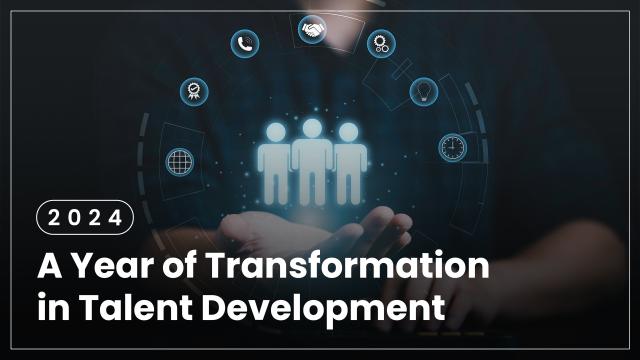The year 2024 brings significant changes in the landscape of learning and Talent Development. Here at Marg, we see a direct connection between projected business needs and employee training. This year promises to be an active one for learning professionals, with the future of work impacting organizations of all sizes.
Related Articles
Key Trends Shaping the Future
Several key trends that significantly impact how companies operate in 2024 and beyond:
The Widening Skills Gap
The World Economic Forum predicts that a staggering 44% of workers’ skills will be disrupted within the next five years. With technology advancing at an unprecedented pace, this number could realistically climb even higher. In 2023 alone, 77% of businesses reported difficulty finding Talent with the necessary skillsets1️⃣. Internal capacity building will be crucial for long-term success.
Employee Engagement
Disengaged employees cost companies dearly in lost productivity. While numerous factors contribute to staff motivation and connection, career advancement and learning opportunities consistently rank high on the list. Meaningful training experiences directly impact employee retention.
Prioritising Staff Well-being
A staggering 44% of employees2️⃣ worldwide report experiencing significant stress at work. This anxiety affects both individual health and company performance, as high stress often leads to lower productivity, increased absenteeism, and “quiet quitting.” Training experts have a unique opportunity to mitigate burnout and its negative consequences.
The Multigenerational Workforce
Today’s workforce encompasses five distinct generations, with Gen Z being the most diverse to date.3️⃣P As companies expand globally and adopt remote or hybrid work models, they’ll increasingly hire talent from various countries and regions. Employee Development programs can bridge the gap and foster collaboration among diverse teams.
The Evolving Workplace
Many companies are still figuring out the role of physical office spaces in the future. While headlines abound about the “return to office” movement, a hybrid approach seems to be the most likely outcome.4️⃣ This has significant implications for how employees are trained to collaborate, communicate, and connect effectively.
The Rise of Artificial Intelligence (AI)
No discussion of trends would be complete without mentioning AI. While the use of AI in business presents both potential and uncertainty, it’s undeniable that it will impact all facets of the workplace, including learning and development. Talent leaders must stay informed about AI’s rapid advancements and consider the implications for their workforce.
The Impact on Talent Development
To create meaningful programs that support the evolving workplace, learning professionals can focus on these key areas:
-
Upskilling and Reskilling
Beyond equipping employees for their current roles, L&D teams must prepare programs that address future needs. Companies that prioritize upskilling and reskilling internal talent will be better positioned for success than those relying solely on external hires. Partnering with leadership to understand shifting skillsets across departments and identifying future requirements is vital. Additionally, focusing on soft skills like communication, critical thinking, and adaptability will empower workers to thrive in a dynamic environment.
-
Investing in Management and Leadership Development
Leaders play a critical role in driving employee engagement and preventing burnout. By investing in leadership development programs, L&D professionals equip supervisors with relevant tools and resources to boost team morale and ultimately, productivity. Consider training in empathy, emotional intelligence, and time management. Solutions like Emergenetics can help leaders understand what motivates their teams and apply that knowledge to inspire them.
-
Facilitating Career Conversations
Skill building is just one aspect of the career growth equation. Learning professionals can equip managers with the skills to conduct productive career conversations, uncovering their direct reports’ long-term aspirations and developing personalised growth plans. Utilising AI to suggest learning opportunities alongside networking resources, external training options, and access to conferences can empower employees to achieve their career goals.
-
Prioritising Wellness
Wellness goes beyond the physical. HR and L&D teams can collaborate to offer stress and time management courses. Empowering supervisors with tools to address pressure within their teams can also be beneficial. Additionally, promoting psychological safety and connection through social-emotional wellness programs fosters a healthier and more positive work environment.
-
Championing Inclusion
As diversity continues to rise in the workforce, talent development specialists can play a role in fostering inclusive workplaces. At Marg, we believe diverse perspectives are a source of strength and innovation. Training initiatives that promote diversity, equity, and inclusion (DE&I) are crucial for cultivating a sense of belonging. Consider programs that address diversity of thought, accessibility, socio-economic differences, and more.
-
Optimising Hybrid Work Models
While the “best” work model remains a topic of debate, most companies have embraced hybrid work as the new normal. This presents an opportunity to optimize this model for success. Seek out best practices for remote collaboration, asynchronous!
Harnessing the Power of Data and AI
The sheer volume of data and AI solutions available can be overwhelming. However, it’s crucial for L&D teams to prioritize the information most relevant to their decision-making.
AI and data hold immense potential for L&D, from identifying the best delivery methods for different content to suggesting personalised learning paths, analysing program effectiveness, and gauging engagement during training.
Here’s how to leverage this power:
Identify Burning Questions: Start by pinpointing the department’s most pressing questions and key performance indicators (KPIs) for success.
Match Data to Priorities: Then, focus on the data sources and AI tools that best address those priorities and answer your burning questions.
By using data and AI strategically, talent development can become a key driver of long-term growth for both the organization and its people.
Interested in learning more about how Marg can help you navigate these trends? Visit our website for resources and insights!
Stats:
1️⃣ Forbes | 2️⃣ HBR | 3️⃣ | PweResearch | 4️⃣ cnbc
The post 2024: A Year of Transformation in Talent Development appeared first on Marg Online.
This post first appeared on Get The Best Corporate Training From Margonline, please read the originial post: here

